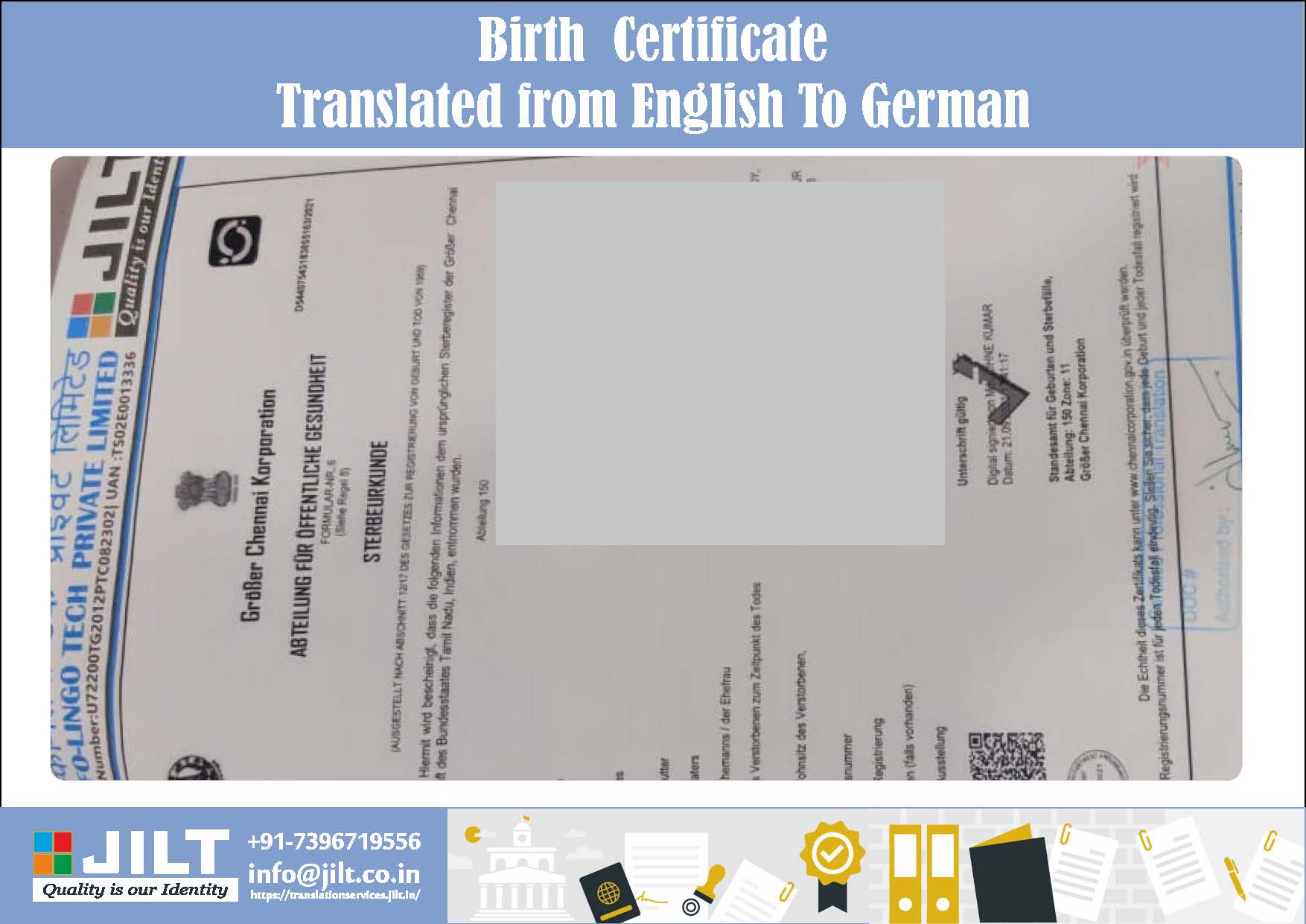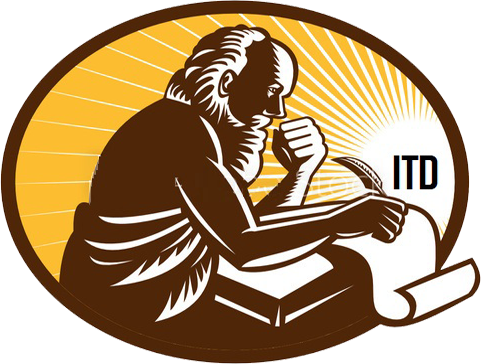
ENSURING LEGITIMACY OF BIRTH CERTIFICATE TRANSLATION FROM ENGLISH TO GERMAN
by Dr. Abu Mazhar Khalid Siddique - September 26, 2023
In a world marked by globalization and increased mobility, the importance of accurate and legally recognized documentation cannot be overstated. Birth certificates, in particular, serve as foundational documents, establishing an individual's identity, nationality, and age. When these documents need to be used in a foreign country, it becomes crucial to translate and attest them to ensure their authenticity and acceptance by the authorities. This blog delves into the significance and various applications of birth certificate translation and attestation from English to German.
Understanding Birth Certificate Translation and Attestation
Before diving into the why and how of this process, let's first clarify what birth certificate translation and attestation entail.
Birth Certificate Translation: This refers to the conversion of the information on a birth certificate from one language (e.g., English) into another (e.g., German). The translation must be accurate and faithful to the original document, as even minor discrepancies can lead to complications.
Attestation: Attestation, on the other hand, is the process of obtaining an official certification or endorsement from a competent authority, verifying the authenticity of the translated document. In the context of birth certificates, attestation often involves a notary public or other relevant government agencies confirming the accuracy of the translation and the legitimacy of the document.
Now, let's explore why birth certificate translation and attestation are so important when dealing with English to German documents.
1. Legal Compliance and Official Recognition: One of the primary reasons for translating and attesting a birth certificate is to ensure that it complies with the legal requirements of the destination country, in this case, Germany. German authorities may require documents to be in the German language to facilitate their understanding and processing. A properly translated and attested birth certificate helps meet these legal requirements and ensures that the document is officially recognized.
2. Immigration and Visa Applications: Birth certificates are frequently a mandatory component of immigration and visa applications when moving to another country. For individuals moving to Germany from an English-speaking country, a translated and attested birth certificate is essential. It demonstrates the applicant's identity, age, and nationality in a format that German authorities can readily accept, facilitating the immigration process.
3. Education and Academic Pursuits: For students looking to pursue an education in Germany, whether at the primary, secondary, or tertiary level, a translated and attested birth certificate is usually a prerequisite. Educational institutions in Germany need this document to verify an applicant's age and educational background. Without proper translation and attestation, a student may face delays or complications in the admission process.
4. Employment Opportunities: In some cases, employers in Germany may require a translated and attested birth certificate as part of their hiring process. This is especially true for positions that involve government contracts or security clearances. A properly translated and attested birth certificate can help applicants prove their eligibility for employment.
5. Legal Proceedings: When dealing with legal matters in Germany, such as marriage, adoption, or inheritance, a translated and attested birth certificate may be necessary to establish one's identity, family relationships, or other legal requirements. Failing to provide such documentation could result in, delays or complications in these proceedings.
6. Personal Record-Keeping: Even outside of legal and official requirements, individuals may find it useful to have a translated and attested copy of their birth certificate in Germany. This document can be a valuable addition to personal records, ensuring that it can be readily accessed and understood in the local language whenever needed.
The Process of Birth Certificate Translation and Attestation
Now that we've established the importance of birth certificate translation and attestation, let's briefly outline the steps involved in this process:
Select a Qualified Translator: Choose a professional translator who is fluent in both English and German and has expertise in legal document translation.
Translate the Birth Certificate: The translator will accurately translate the birth certificate, ensuring that all details, including names, dates, and places, are faithfully reproduced in German.
Notarization and Attestation: After translation, the document must be notarized by a notary public or a relevant government agency. This step involves confirming the accuracy of the translation and attesting to the authenticity of the document.
Legalization, if required depending on the specific circumstances, the document may need further legalization, such as an apostle, to be recognized internationally.
Submission to Authorities: Once the birth certificate is translated, notarized, and legalized (if required), it can be submitted to the relevant authorities in Germany, whether for immigration, education, employment, or other purposes.
Birth certificate translation and attestation from English to German are vital processes with a wide range of applications. They ensure legal compliance, official recognition, and ease of use for individuals in various situations, from immigration to education and employment. While these processes may seem complex, they are crucial for navigating the legal and bureaucratic requirements of a foreign country like Germany. Investing in accurate translation and proper attestation of your birth certificate is a small step that can open doors to countless opportunities and ensure your documents are recognized and accepted where it matters most.
Our organization employs native-speaking translators who can provide certified translation services in any language. We provide translation services in English (Urdu), Arabic (Spanish), German (French), Persian (Iranian), French (Italian), Japanese (Korean), Russian, and any other Indian or local language. Expert proofreaders at our company will inspect the translation. We also provide a courier service to deliver completed documents to our clients.
- Also Read :- HOW IS THE MOST POPULAR TRANSLATING TELUGU DOCUMENTS IN THE WORLD
- Also Read :- A BIRTH CERTIFICATE IS IDENTITY DOCUMENTATION AND VERIFICATION OF PERSONAL INFORMATION.
- Also Read :- Product Testing Certificate Translation Service
- Also Read :- A ROADMAP FOR CHOOSING THE BEST TRANSLATION MANAGEMENT SYSTEM
- Also Read :- Keywords Research Is backbone for Multilingual SEO
- Also Read :- UNLOCKING OPPORTUNITIES: THE IMPORTANCE OF DEGREE CERTIFICATE TRANSLATION
- Also Read :- UNLEASHING THE POWER OF LEGAL TRANSLATION IN THE TRANSLATION INDUSTRY
- Also Read :- MOST LANGUAGES USED ON THE INTERNET FROM THE BEGINNING
- Also Read :- Authority Letter Translation Services
- Also Read :- HISTORY OF SPANISH LANGUAGE
Search
Categories
Archives by Month
Popular Blog
QUICK TRANSLATION QUOTE
Need help with a translation?
Get in touch with us
Whether you have a specific project you want to discuss, need a translation quote or simply want to discuss your requirements, do not hesitate to get in touch with us.











Social Networks